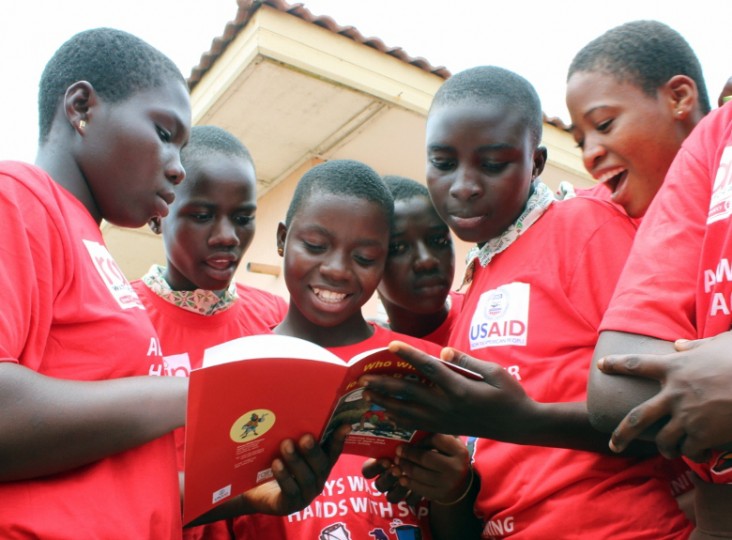Washing Away School Absences

Clad in their orange shirts and brown jumpers, Maybelle and Comfort are two bright-eyed young girls who have been given a chance at better health, better education, and increased lifetime earnings. Thanks to the USAID Ghana WASH project, Assin Kumasi Kindergarten, Primary, and Junior High School in the rural community of Beposo, Ghana got access to improved sanitation for the first time in the form of a four-seater institutional latrine. This new facility has made going to school a safer, more comfortable experience, especially for junior high school girls like Maybelle and Comfort.
Despite educating more than 400 students, the school only had one latrine that had two seats. Maybelle said that she and her friends were forced to resort to open defecation in the nearby bush, sometimes taking as long as ten minutes to find a private place to go. “We would have to search to find a place to go [in the bush],” she said. “If you want to use the toilet, there were kindergarten and primary [students] there and it was so full you didn’t have any privacy.”
When the young girls started menstruating, the school’s lack of sanitation and privacy began to threaten their education. In Ghana and much of the developing world, it is common for pubescent girls to stop attending school when they lack proper sanitation and privacy during their periods. So the USAID Ghana WASH project constructed a new institutional latrine that provided the proper sanitation and privacy to enable all students to thrive.
The new institutional latrine is divided into two sides by a cement wall and includes a changing room. The existing latrine is now for the kindergarten and primary school students.
Now, Maybelle and Comfort say they do not have to worry about missing class time to take care of their needs. “We have more privacy now,” Comfort said. She said nearly everyone uses the latrine now because there are enough stalls. And the benefits spread across the entire community by reducing the risk of diseases that result from open defecation.
The school has become the center of efforts to build demand for sanitation and hygiene throughout the community. “In [students’] homes, out of 10 households, just one may have a household latrine,” said Ms. Gloria Duha, a teacher and the School Health Education Program (SHEP) club leader. Ms. Duha teaches her students how to keep their hands, bodies, and surroundings clean to protect their health. Most of these students are learning about sanitation and hygiene for the first time. By observing the students that she works with – almost half of whom are girls – Ms. Duha sees the teachings having a ripple effect: As she passes these lessons onto her students, the students in turn educate and influence their classmates at school and families at home.
Ms. Duha and her students further build demand for sanitation and hygiene in the community by developing and performing educational dramas about hygiene issues at the school’s regular Parent Teacher Association meetings. Their first drama focused on the importance of washing your hands with soap at critical times, including after using the toilet and before cooking and eating. The students applied the lessons they learned in the SHEP club and made them relevant to community members through the shows – reaching adults in a new way.
“With our school-based initiatives, it is remarkable how young leaders step to the forefront and take an active role in the health clubs,” said Sean Cantella, Chief of Party of the USAID Ghana WASH Project. “When you see them in action, it reconfirms that we’re making a difference in these kids’ lives.”
V. Okoye







Comment
Make a general inquiry or suggest an improvement.